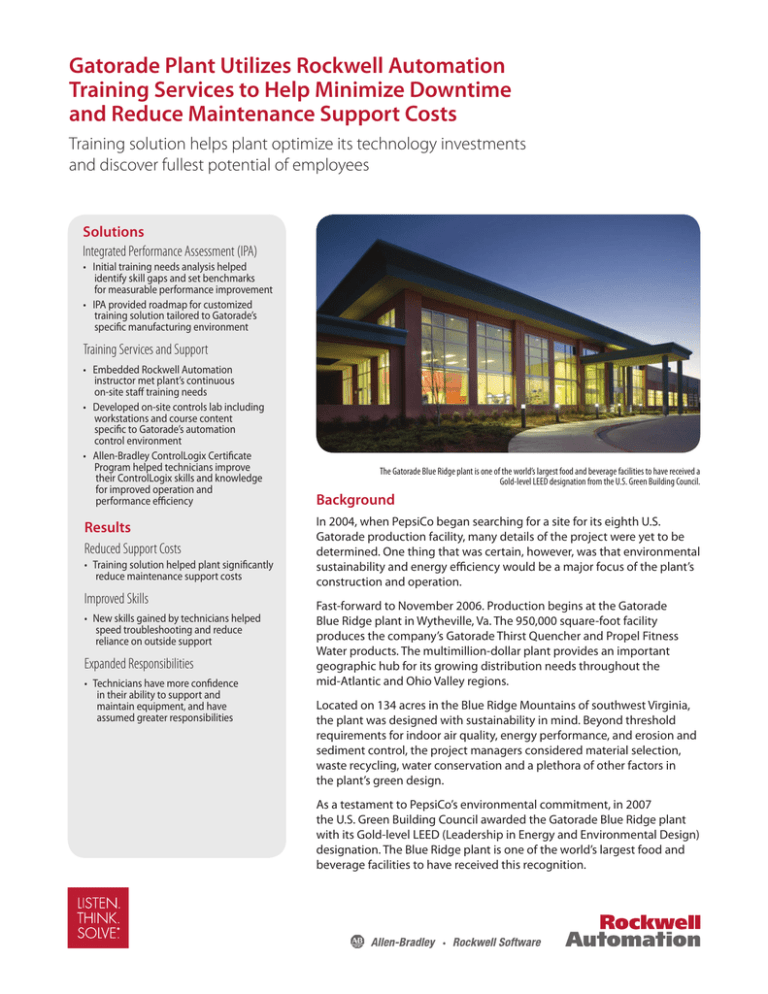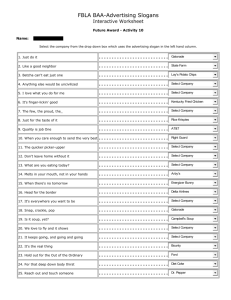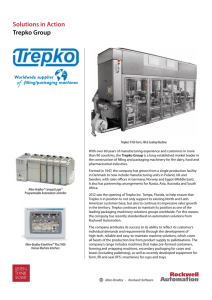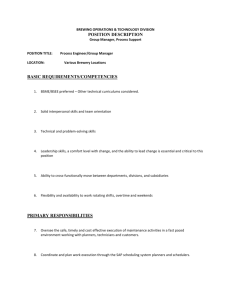
Gatorade Plant Utilizes Rockwell Automation
Training Services to Help Minimize Downtime
and Reduce Maintenance Support Costs
Training solution helps plant optimize its technology investments
and discover fullest potential of employees
Solutions
Integrated Performance Assessment (IPA)
• Initial training needs analysis helped
identify skill gaps and set benchmarks
for measurable performance improvement
• IPA provided roadmap for customized
training solution tailored to Gatorade’s
specific manufacturing environment
Training Services and Support
• Embedded Rockwell Automation
instructor met plant’s continuous
on-site staff training needs
• Developed on-site controls lab including
workstations and course content
specific to Gatorade’s automation
control environment
• Allen-Bradley ControlLogix Certificate
Program helped technicians improve
their ControlLogix skills and knowledge
for improved operation and
performance efficiency
Results
Reduced Support Costs
• Training solution helped plant significantly
reduce maintenance support costs
Improved Skills
• New skills gained by technicians helped
speed troubleshooting and reduce
reliance on outside support
Expanded Responsibilities
• Technicians have more confidence
in their ability to support and
maintain equipment, and have
assumed greater responsibilities
The Gatorade Blue Ridge plant is one of the world’s largest food and beverage facilities to have received a
Gold-level LEED designation from the U.S. Green Building Council.
Background
In 2004, when PepsiCo began searching for a site for its eighth U.S.
Gatorade production facility, many details of the project were yet to be
determined. One thing that was certain, however, was that environmental
sustainability and energy efficiency would be a major focus of the plant’s
construction and operation.
Fast-forward to November 2006. Production begins at the Gatorade
Blue Ridge plant in Wytheville, Va. The 950,000 square-foot facility
produces the company’s Gatorade Thirst Quencher and Propel Fitness
Water products. The multimillion-dollar plant provides an important
geographic hub for its growing distribution needs throughout the
mid-Atlantic and Ohio Valley regions.
Located on 134 acres in the Blue Ridge Mountains of southwest Virginia,
the plant was designed with sustainability in mind. Beyond threshold
requirements for indoor air quality, energy performance, and erosion and
sediment control, the project managers considered material selection,
waste recycling, water conservation and a plethora of other factors in
the plant’s green design.
As a testament to PepsiCo’s environmental commitment, in 2007
the U.S. Green Building Council awarded the Gatorade Blue Ridge plant
with its Gold-level LEED (Leadership in Energy and Environmental Design)
designation. The Blue Ridge plant is one of the world’s largest food and
beverage facilities to have received this recognition.
Challenge
In order to optimize the performance and efficiency
benefits provided by the plant’s cutting-edge automation
and control equipment, it is critical that maintenance
technicians have the skills required to fully support the
technology. An equally important component in the
plant’s sustainability effort is keeping operating costs
as low as possible.
After reviewing the maintenance expenses during its first
year in operation, plant managers saw an opportunity to
achieve significant cost reductions by better capitalizing
on the skill potential of its in-house maintenance staff.
The solution required customized training designed to
keep technicians up to speed on the technology and
better prepare them to assume greater responsibility for
equipment inspection, maintenance and troubleshooting.
In 2007, the plant’s management team developed
an action plan to identify ways to significantly reduce
its maintenance costs within three years. Managers
believed that with the skill potential available in-house
and with proper training, they could not only achieve
their immediate goals, but their effort would provide
an ongoing return on their investment.
“We needed a training solution that was tailored to
our site and could be implemented cost efficiently with
minimal impact on productivity,” said Warren Chandler,
maintenance and reliability manager at the Gatorade Blue
Ridge plant. “The objective was to make sure technicians
had the knowledge they needed to troubleshoot and
solve immediate problems while continuing to improve
overall plant efficiency over the long term.”
Solution
PepsiCo worked with Rockwell Automation to develop
a training solution that would help its maintenance staff
understand the automation and control technology
installed on the plant floor. Improving the knowledge
base of its technicians would help them more quickly
address production line issues without having to rely
on outside support.
The first step for Rockwell Automation was to conduct
an Integrated Performance Assessment (IPA) to identify
performance inhibitors and assess existing skill sets of the
plant’s maintenance technicians. This would help identify
critical areas of need and provide a detailed roadmap for
developing a customized training solution tailored to the
plant’s specific manufacturing environment.
Based on the findings of the IPA, Rockwell Automation
recommended that all maintenance technicians complete
introductory and intermediate level technology training.
From there, plant managers offered a select group the
opportunity to accelerate their learning to include
integration, troubleshooting and programming training.
“Rockwell Automation designed a solution that fit nicely
into our overall vision of improving the knowledge base
of our staff while reducing our long-term operating
costs,” Chandler said. “The solution gave us the flexibility
to predetermine what levels of training we wanted
to implement to meet our needs and in a way that
maximized staff time and optimized our investment.”
Another recommendation of the IPA was the
implementation of an embedded Rockwell Automation
instructor to meet the plant’s continuous on-site training
needs. Equipped with extensive hands-on experience and
technical expertise, the embedded instructor remained
on-site for 65 days, providing Gatorade’s maintenance staff
with customized performance-based training that aligned
with the plant’s goals and the criticality of each system.
The embedded instructor also implemented an on-site
controls lab that included training workstations, lab
exercises and course content specific to Gatorade’s
automation environment. This allowed technicians to
practice troubleshooting, maintenance and programming
skills as part of a self-guided curriculum while giving
managers better staffing flexibility to meet the plant’s
demanding seven-days-per-week production schedule.
“The embedded instructor provided a level of immediacy
and responsiveness that proved invaluable in helping
technicians understand and effectively apply what
they’ve learned directly to the plant floor,” Chandler said.
“The daily interaction and weekly meetings to discuss
performance changes, needs and concerns helped
accelerate the learning process and gave technicians an
important confidence boost in their skills and abilities.”
Results
The implementation of the training solution has helped
the Gatorade Blue Ridge plant achieve significant
operating cost reductions, including reducing its
maintenance-related support expenses, as outlined
among its primary goals. The new skills acquired by
the maintenance technicians have helped minimize
unplanned downtime and drastically cut the plant’s
reliance on outside support services.
“Before we started the program, our controls engineer
was getting three to five calls per week during third shift,
requiring several hours of his time,” Chandler said. “Now
it’s very rare that he gets a phone call – maybe once every
two to three weeks, which has improved our efficiency
and helped reduce our support costs.”
Among the technicians who completed the introductory
and intermediate level training, eight of those elected
to enroll in the nationally recognized Allen-Bradley®
ControlLogix® Certificate Program. All eight successfully
completed the program and earned a certificate.
us get to where we wanted to be,” Chandler said. “The IPA
provided a detailed action plan that was tailored to our
specific needs, allowing us to optimize our investment
and achieve faster, more immediate results. I don’t think
we could have asked for a better execution than this.”
“Advanced technology demands advanced skills, and
that’s precisely what our technicians have gained through
this training solution,” Chandler said. “Their initial fears
quickly turned into motivation and excitement as they
progressed through the training courses and began
assuming more and more responsibilities.”
Managers at the Blue Ridge plant have shared the results
of the training solution with other Gatorade facilities.
Several have expressed interest and are currently
evaluating how they might also benefit from a
customized Rockwell Automation training solution.
Since implementing the training solution, technicians
have improved the speed and accuracy in solving
equipment problems while maintenance and support
costs continue to decline. These results, combined with
the plant’s high productivity help to further optimize its
overall manufacturing performance.
“Rockwell Automation not only delivered what it
promised, but coached us through the process to help
The breakthroughs achieved at the Blue Ridge plant have
set new standards for performance and efficiency, and
offer companies a working template on how to optimize
the benefits of new technology.
The results mentioned above are specific to Gatorade’s use of Rockwell Automation products and services in conjunction
with other products. Specific results may vary for other customers.
Allen-Bradley, ControlLogix, FactoryTalk, FLEX, Integrated Architecture, PartnerNetwork and PlantPAx are trademarks of Rockwell Automation, Inc.
Trademarks not belonging to Rockwell Automation are property of their respective companies.
Publication BEVVP-AP005A-EN-P – April 2010
Copyright © 2010 Rockwell Automation, Inc. All Rights Reserved. Printed in USA.



